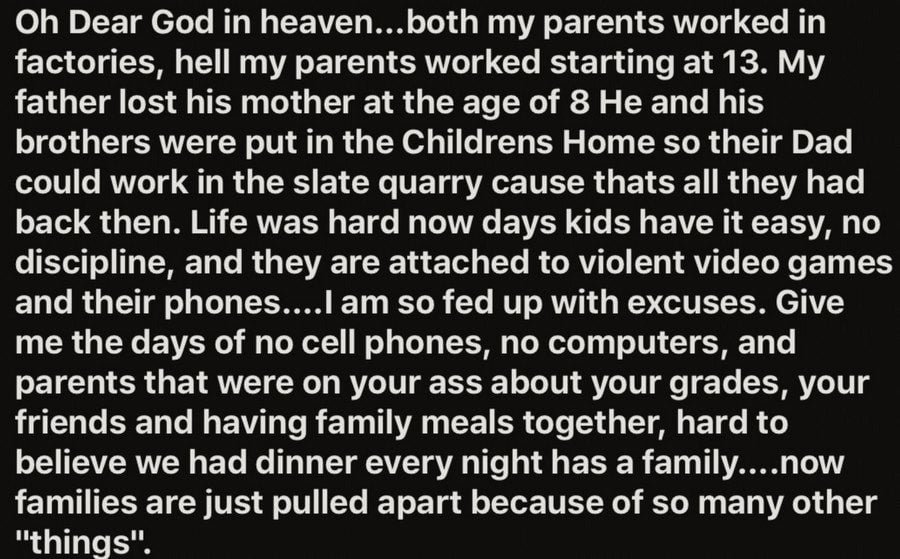
Following in the footsteps of their parents and their grandparents before them, Baby Boomers have taken to criticizing the latest generation of American children. These snowflakes, as Millennials/Gen Z/Gen Alpha are disparagingly called, have it easy, according to their critics. Often, criticisms are followed with “back in the day” anecdotal stories meant to prove that teenagers and young adults are living on easy street compared to their parents and grandparents. If only our society would return to the good ‘ole days, Baby Boomers say, all would be well.
Armed with selective memories or showing signs of dementia/Alzheimer’s, Baby Boomers have posted to social media countless memes and comments about how better their youthful days were than are those today. What Baby Boomers don’t mention is the instrumental part they have played in making things the way they are today. Who are the people running the government? Who are the corporate CEOs and the heads of media outlets? For the most part, Baby Boomers. Millennials don’t control much in this country. It’s their parents’ and grandparents’ generations that control everything. It’s not Millennials who elected Donald Trump. It’s not Millennials who are in charge of the American war machine. It’s not Millennials who have destroyed the working class and outsourced millions of American jobs. It’s not Millennials who have driven up healthcare costs. If Baby Boomers want to find who’s to blame for all these things (and more), they need only look in the mirror. And while they are gazing at their aged “sixty is the new thirty” faces in the mirror, they might want to ask the Greatest Generation to join them. Millennials are certainly not without fault, but to lay the blame for societal ills at their collective feet is not only laughable, it is also a denial of past history and present reality.
Millennials are the first generation to be born into the technology revolution. Their parents came of age in a world without most of the technology that drives our present age. My wife and I will celebrate forty-five years of marriage in July. Until the late 1980s, our life pretty much mirrored that of our parents. Outside of having 8-track/cassette players instead of record players and push-button telephones instead of rotary dial phones, our day-to-day living wasn’t much different from that of the homes we grew up in. Certainly, societal mores were rapidly changing, but Polly and I were insulated from these changes thanks to our immersion in Evangelical Christianity.
In the 1990s, computers became affordable for many people. From that point until today, we have experienced non-stop technological advancement. We now live in world dominated by computers, smartphones, — which are handheld computers with built-in monitors — the worldwide web (www), and social media. In a matter of seconds, we can send text messages, photographs, and emails across the globe. We can talk via Skype to people continents away. Social media allows us to be friends with people that we would never have met had it not been for Facebook, Twitter, Instagram, and the like.
This is the world of Millennials. Should they be faulted for embracing the modern technological age? Who made all these wonders available to them? Who built the companies and products that play such an integral part in their lives? Better look in the mirror again, Baby Boomers. Sure, it’s primarily Millennials who invented social media, but without the work of aged men such as Bill Gates, Steve Jobs, and countless other Baby Boomers, there wouldn’t be an Internet, nor would there be smartphones and social media. Like it or not, Baby Boomers, the world as it is now was created and shaped by us.
I am almost sixty-six years old. Like many of my generation, I don’t like some of the behaviors I see coming from Millennials. But, I also know that my parents and grandparents thought the same about my generation. Being criticized by previous generations is a rite of passage. I am a father to three Gen-Xers and three Millennials. I have thirteen grandchildren, one of whom is twenty-two, and three others who are in high school. In less than fifteen months two of them be in college. My older grandchildren are very much a part of the tech generation (as much as their parents will allow them to be, anyway). Are my children and grandchildren inferior/less hardy than my generation or that of their grandparents? Of course not. What they are is different. They were born into a world very different from the world I entered in 1957. Their experiences, in many ways, are different from those I had as a teen and young adult in the 1970s and 1980s. Yet, their wants, needs, and desires are not much different from what mine were years ago.
As a sports photographer, I spent a good bit of time around local high school students. I carefully watched their behavior and interaction with not only their fellow students, but with society at large. I found, at a base level, kids are kids. Environments change, but kids remain the same. We oldsters do a great disservice to our society when we refuse to see the good in younger Americans; when we refuse to grant that maybe, just maybe, our children and grandchildren have much to offer the human race (despite being hamstrung by runaway government debt, lack of jobs, and astronomical education costs). Millennials are not without fault, but they certainly are not the people described by many of the memes and social media comments I have seen in recent years. One Baby Boomer Facebook friend of mine posted a meme that blamed video games and rap music for school shootings. I shook my head and laughed as I read comment after comment from people agreeing with her. Never mind the fact that video games actually reduce male aggression and that children today are safer than they ever have been (except at school). And music lyrics? Really? Baby Boomers are the classic rock generation. Have they forgotten what the lyrics of their favorite rock songs actually say? Yes, the music loved by Millennials is more explicit, often using graphic words to describe sexual activity, but the music of yesteryear had its own language for sexual activities. In 1976, the Starland Vocal Band released a song titled Afternoon Delight. The lyrics went like this:
Gonna find my baby, gonna hold her tight
Gonna grab some afternoon delight
My motto’s always been “When it’s right, it’s right”
Why wait until the middle of a cold dark night
When everything’s a little clearer in the light of day
And we know the night is always gonna be here any wayThinkin’ of you’s workin’ up my appetite
Looking forward to a little afternoon delight
Rubbin’ sticks and stones together make the sparks ignite
And the thought of loving you is getting so excitingSky rockets in flight
Afternoon delight
Afternoon delight
Afternoon delightStarted out this morning feeling so polite
I always thought a fish could not be caught who didn’t bite
But you’ve got some bait a waitin’ and I think I might
Like nibblin’ in a little afternoon delightSky rockets in flight
Afternoon delight
Afternoon delight
Afternoon delightPlease be waiting for me baby when I come around
We could make a lot of lovin’ ‘fore the sun goes downThinkin’ of you’s workin’ up an appetite
Looking forward to a little afternoon delight
Rubbin’ sticks and stones together make the sparks ignite
And the thought of loving you is getting so excitingSky rockets in flight
Afternoon delight
Afternoon delight
Afternoon delight
Afternoon delight
Afternoon delight
If this song were written today, I suspect its author would make ample use of the “F” word and other sexually explicit words. The reason these words weren’t used in the 1970s was because of the Greatest Generation’s puritanical view of certain words. Sexual meanings were hidden behind euphemisms and double entendres. In 1968, the song, “Why Don’t We Do it in The Road” was recorded for the White Album by the Beatles. The entire song was of Paul McCartney repeating:
Why don’t we do it in the road
Why don’t we do it in the road
Why don’t we do it in the road
Why don’t we do it in the road
No one will be watching us
Why don’t we do it in the road
What exactly was IT that they were doing in the middle of the road? If this song was written today, I suspect the word IT would be replaced by the word FUCK. Is one version any better or worse than the other? Of course not. Different, yes; bad/worse, no. One rendering requires reading between the lines, the other doesn’t.
Baby Boomers love to get all wound up about sexting and other ill-advised behavior by Millennials. These gray-haired “saints” forget that they are the ones who ushered in the sexual revolution, and that they used notes instead of texts to set up intimate liaisons. What I am saying is this: kids are kids, and their parents and grandparents need to lay off constantly judging them and criticizing their way of life. Have these oldsters forgotten how such attacks make someone feel? Baby Boomers raised in the Evangelical church, have oh-so “fond” memories of sermons about the evils of premarital sex, rock music, smoking pot, miniskirts, and long hair on men. Surely, we can help, instruct, and guide our children and grandchildren without denigrating the things they value and consider important. If we can honestly remember our own youthful lives and indiscretions, perhaps we might not be so judgmental towards Millennials.
As a father and grandparent, I love and respect my children and grandchildren. They are far from perfect, and they can do things that drive me nuts, but I know from my own experiences that every generation has to find its own way. Millennials face challenges that their parents never had to face. We live in a fast-paced world where things change overnight. Older Americans have the luxury of ignoring changes they don’t like. Millennials, on the other hand, must continue to change and adapt. Their world is fraught with dangers and challenges Baby Boomers never had to face. They need our help, not our judgment and derision.
Bruce Gerencser, 68, lives in rural Northwest Ohio with his wife of 47 years. He and his wife have six grown children and sixteen grandchildren. Bruce pastored Evangelical churches for twenty-five years in Ohio, Texas, and Michigan. Bruce left the ministry in 2005, and in 2008 he left Christianity. Bruce is now a humanist and an atheist.
Your comments are welcome and appreciated. All first-time comments are moderated. Please read the commenting rules before commenting.
You can email Bruce via the Contact Form.


